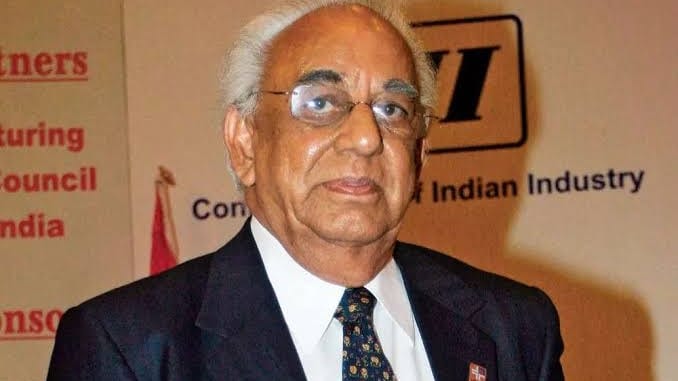
Dr V Krishnamurthy, the former chairman of several public sector undertakings like Bharat Heavy Electricals Limited (BHEL), Gas Authority of India Limited (GAIL), Steel Authority of India Limited (SAIL) and Maruti Udyog (renamed to Maruti Suzuki), passed away yesterday at the age of 97. Krishnamurthy, known as the ‘turnaround man’ in industrial circles, had worked with five Prime Ministers – Lal Bahadur Shastri, Indira Gandhi, Morarji Desai, Rajiv Gandhi and Manmohan Singh – and was an instrumental part of turning India’s PSUs into successful business ventures.
“His contribution to the growth of India was immeasurable. It (demise of Krishnamurthy) is a great loss to Indian industry and to the country. I will certainly miss his genial and wise presence”, said TVS Motor Company chairman emeritus Venu Srinivasan on Krishnamurthy, reported PTI.
“A true legend among public sector managers, a man who built BHEL, turned around SAIL and launched Maruti is no more. V. Krishnamurthy had a glorious innings but missed his century by just three years. He’ll remain an important part of Indian economic history,” Congress leader Jairam Ramesh tweeted.
Considered by many to be the “the father of public sector undertakings in India”, Krishnamurthy started his career as an airfield technician during the Second World War. Soon after, Krishnamurthy started his stint in BHEL and was monumental in turning the PSU into the industrial giant it is today. His stint in GAIL and then SAIL resulted in similar success. Krishnamurthy was chosen as the Business India Businessman of the year in 1987 because of the SAIL turnaround story. But it was in his role as the Founder Chairman and CEO at Maruti Udyog that Krishnamurthy found his most lasting success.
Contribution of V Krishnamurthy to growth of India immeasurable, says Venu Srinivasan
Krishnamurthy was instrumental in the development of the Maruti 800, which made it possible for Indian families to own and drive a car. It was a milestone for Maruti Udyog to sign a joint venture agreement with Japan’s Suzuki Motor Corporation in 1982 and it happened under the leadership of Krishnamurthy.
“In his initial remarks, he asked the managers, ‘I went through your appraisal reports. Almost all of you seem to be outstanding performers. Tell me the secret of producing a loss-making company with so many outstanding performers?’ It laid a strong foundation for reviewing and replanning their new PMS in SAIL and also gave birth to Priorities for Action,” recalled TV Rao, Chairman TVRLS, on one of Krishnamurthy’s first meetings after taking over as the Chairman of SAIL.
“He is known to build leaders wherever he worked. He is a true leader and an unassuming role model,” Rao added.
Maruti Suzuki India chairman RC Bhargava described Krishnamurthy as an outstanding leader and a visionary who introduced the Japanese work culture in India through Maruti Udhyog. “Had it not been for him I would have remained in administration only,” Bhargava was quoted as saying by NDTV.
“Dr. V Krishnamurthy was a Colossus. As the Chairman of SAIL, he brought many changes in SAIL, which were simply revolutionary. He was a great leader, always very humble and polite,” wrote former Chief General Manager (MKT) at SAIL, Deo Kumar Ghatak.
Rakesh Kumar Singhal, former head of corporate affairs at SAIL, shared how Krishnamurthy turned around SAIL.
“Back in 1985 as a junior manager when I got a booklet titled #Priorities for #action with a covering letter signed by Chairman V Krishamurthy Sir . I can still recall my sense of ethereal feeling. The booklet became a guiding light for SAIL turn around. Mr V Krishamurthy turned around Steel Authority of India Limited, instilled confidence and self-belief in people with his hands-on approach. Before his becoming Chairman, the connection of grass-root level at many corners of the organisation with the top echelons was of very limited nature,” wrote Singhal, who had joined SAIL as a trainee in 1983.
Great stress was laid by him personally on improved #communication throughout the length and breadth of the mammoth enterprise.
In a LinkedIn post, Singhal revealed how Krishnamurthy personally supervised improved communication across all departments of SAIL, “Briefing groups were set up to brief employees about major policy issues. Shift meetings were encouraged. Two-way communication with the rank-and-file was strongly emphasised. Suggestion schemes were revamped.”
According to Singhal, Krishnamurthy’s vision even today guides all organisations he headed.
Another ex-employee of SAIL, Ravi Kumar K Pillai, recalled how V Krishnamurthy’s exemplary leadership and commitment turned SAIL from a mediocre PSU to a promising public sector giant.
“I was fortunate to work closely with him when he came in to head SAIL and lead it from a bleeding, comatose giant of mediocrity to a promising symbol of public sector revival. He enthused a lot of young professionals like me. What stood out in his leadership style was the passionate commitment, radiating optimism and ability to cut across hierarchy and status to reach a mix of talent whom he galvanised into ambassadors for change. Communication, empathy and engagement through direct in-person dialogues were the hallmarks of his leadership,” wrote Ravki Kumar in a LinkedIn post.
For his services to the nation, Krishnamurthy was awarded the Padma Shri in 1973, Padma Bhushan in 1986 and the Padma Vibhushan in 2007, along with the Order of the Rising Sun, the highest civilian honour in Japan, by the Japanese government for his contributions to bilateral economic ties between the two countries.